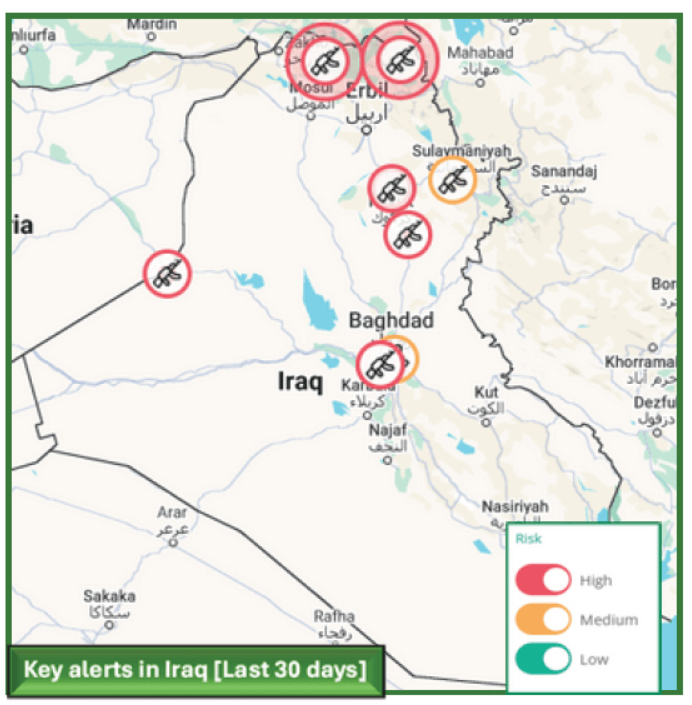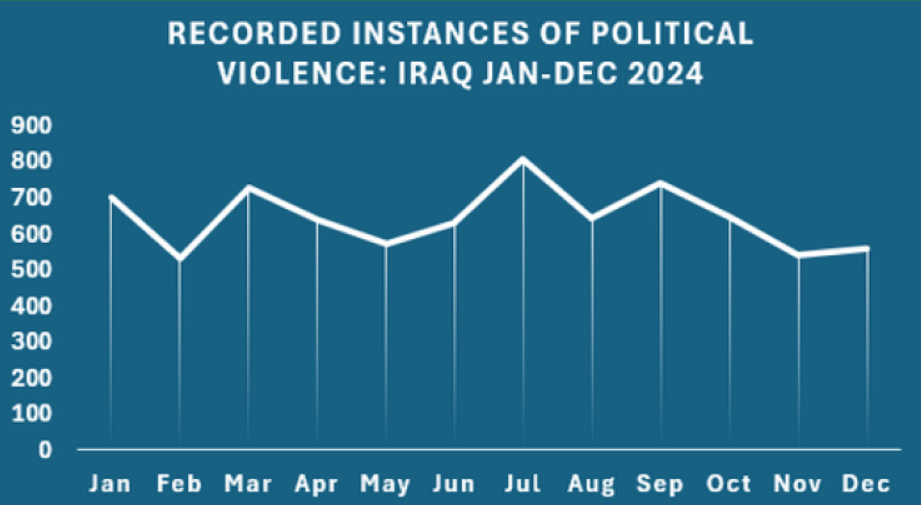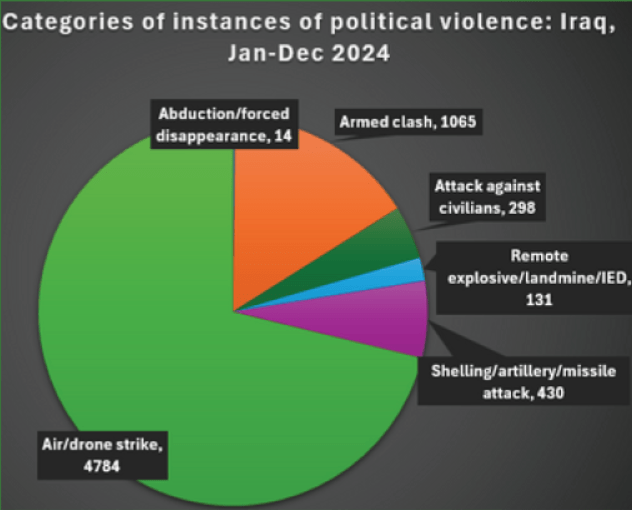
Eigenrac Regional Intelligence Reporting and Analysis
Security Insights – Iraq Jan 16 – 2025
KEY DEVELOPMENTS IN IRAQ THIS WEEK
Al-Nujaba suspends military operations following Gaza truce: The Secretary-General of the Al-Nujaba Movement, Akram Al-Kaabi, announced the suspension of military operations against Israel in solidarity with the ceasefire in Gaza. In his statement, Al-Kaabi commended the resilience of the Palestinian people and international supporters, including Iran, Yemen’s Ansar Allah, and Hezbollah. He emphasized that while operations are paused to reinforce the truce, the group remains prepared to respond to any perceived provocations, asserting readiness with “fingers on the trigger” and missile systems on standby to react if hostilities resume.
Iraqi forces arrest senior ISIS financial and logistics operative: Iraqi military intelligence captured a senior ISIS operative in Hawija, Kirkuk province, on 15 January. Described as the “financial guarantor and military uniform tailor” for the group, the suspect managed financial allowances for ISIS-affiliated families and oversaw the production of military uniforms. The high-precision operation, conducted by the 8th Division’s Intelligence Unit, was enabled by advanced intelligence gathering and field surveillance. Earlier in the reporting period, Iraqi F- 16 jets struck an ISIL hideout in the Hamrin Mountains, followed by counter-terrorism forces who discovered six ISIL bodies, including the deputy governor of Kirkuk.

Risk Categories
Conflict: CRITICAL Crime: High Health and Medical: High Kidnap and Ransom: High Personal Safety: High Natural and Environment: Medium Political Overview: High Terrorism: CRITICAL Unrest: High
Turkish intelligence neutralizes senior PJAK leader in Kurdistan Region: Turkish intelligence neutralized Islam Dotkanlou, a senior leader in the Kurdistan Free Life Party (PJAK), and his bodyguard Akam Shahi in a precision operation in Al-Sulaymaniyah’s Penjwin region, security sources announced on Wednesday. Dotkanlou, a high-priority target due to his leadership role in PJAK, was tracked using Turkiye’s intelligence network in Iraq. Also during the reporting period, a Turkish helicopter flying at low altitude was struck by a missile in Qandil Heights near the Turkish-Iraqi border, the fourth such incident recently.
Recorded Instances of Political Violence and Civil Unrest


Northern Iraq is seeing an increase in targeted attacks on Turkish military forces by Kurdish militant factions. The rise in missile, drone, and sniper operations, particularly around the Qandil and Penjwin regions, signals a sustained and growing insurgency that challenges the security of Iraq’s northern provinces. Given the growing sophistication of these attacks, including the recent missile strike on a Turkish helicopter, there is a realistic possibility of increased hostilities and cross- border tensions. This situation could undermine security along critical infrastructure lines in the region, with potential ramifications for any activities in areas that lie in the proximity of Kurdish strongholds. With Turkey’s continued military presence and its countermeasures against Kurdish militants, the medium to long term will likely see ongoing military clashes and potentially more risk of disruption to regional stability.
The £12.3 billion agreements between Iraq and the UK, focusing on energy, water, and border security, are likely to stimulate growth but may expose Iraq to new security challenges. There’s a realistic possibility that the development of critical infrastructure in regions like Basra may attract attention from regional militants and political factions that oppose foreign influence or infrastructure projects. In the medium term, Iraq’s security forces will face heightened pressure to protect these developments from physical attacks or sabotage, particularly as foreign companies become increasingly involved in key sectors like infrastructure, oil and gas.
Protests in Al-Qurna, led by Sheikh Hussein Al-Muzirawi and centered around demands for better services, job creation, and environmental improvements, highlight growing discontent in oil-rich Basra Governorate over inadequate public infrastructure and perceived inequities in resource allocation. The explicit warning to escalate demonstrations to the strategically vital Majnoon oil field underscores the near-term risk of disruptions to oil production and revenues, potentially impacting Iraq’s economy and energy markets. Given the precedent set by earlier successful protests in the Imam Al-Sadiq district, it is likely that the Al-Qurna movement could achieve similar concessions if authorities seek to prevent economic or operational disruptions. However, the potential for escalation remains high if demands are not met within the stipulated 14 days, signaling a realistic possibility of intensified unrest that could strain local governance and exacerbate broader regional instability.